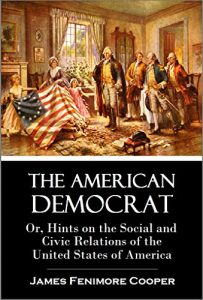The American Democrat: Or, Hints on the Social and Civic Relations of the United States of America, a political essay written by American republican author James Fenimore Cooper, was published initially in New York State in 1838. Originally intended as a textbook on the American republican democracy, the work analyzes the social forces that shape, and can ultimately corrupt such a system.
Unlike his previous work where he set out to create American literature, this essay is credited with helping Cooper to establish a new identity as a writer as one who exposed the vices in society.
The American Democrat arose out of three major events in Cooper's life. The first was his experience abroad. Cooper had lived in Europe – mainly in Paris– between 1826 and 1833. This experience, according to Cooper, helped him become "a foreigner in his own country,"allowing him to "present to the reader those opinions that are suited to the actual condition of the country, [rather] than to dwell on principles more general."
The American Democrat also arose out of the Three Mile Point dispute, which ended on July 22, 1837. This controversy began when the people of his hometown, Cooperstown, trespassed onto his property, using it as a picnic ground. After Cooper's publication of a notice about trespassing on his land, the citizens and the press of Cooperstown organized a protest against him. Attacks by the Whig newspapers continued even after Cooper had proved his ownership of that piece of property. This occurrence led Cooper to write about the role of property rights in America, "giv[ing] universal meaning" to the dispute.
The final event in Cooper's life that influenced his message in The American Democrat was his experience with libel lawsuits. His struggles with the Whig press, who had published libelous statements about him, escalated between 1837 and 1838.
Cooper argues that the principles of natural justice should be the basis of all governments. Within a democracy, he also claims an increasing need to protect these principles because they are susceptible to the natural selfishness of those in power. In a representative, constitutional republic, like the United States, the United States Constitution acts as a social contract between the states and their leaders. This distinction raises the question of the role of the states, which Cooper believes are sovereign in their own way because they consent to their union under a federal government.
In that sense, political power in the U.S. is a trust granted by the constituent to the representative in deliberate institutions, checking and balancing each other. Therefore, it is imperative for representatives to work within the limits of their respective branches of government. In his view, the American government is at its best when those in power strictly adhere to the system put in place by the Constitution. Thus, in theory, the Constitution provides the necessary restraints on power so that men cannot pursue their own interests.
It is the role of the citizen to responsibly exercise his God-given right to self-government. Every citizen must also obey the laws and guard the rights of his fellow man. To Cooper, such a human contract and moral obligation is a Divine Truth. Also, the American democrat must keep his representatives in check, constantly questioning their motives and objectively judging policy initiatives in comparison with the constitution, not their own values, prejudices, or opinions.
Cooper argued that there were three factors endangering democracy – public opinion, demagoguery, and the press. He believed that the corruption of these things made political liberty, equality, rights, and justice more abstract notions rather than true pillars of society.
Originally published in 1838; reformatted for the Kindle; may contain an occasional imperfection; original spellings have been kept in place.
Unlike his previous work where he set out to create American literature, this essay is credited with helping Cooper to establish a new identity as a writer as one who exposed the vices in society.
The American Democrat arose out of three major events in Cooper's life. The first was his experience abroad. Cooper had lived in Europe – mainly in Paris– between 1826 and 1833. This experience, according to Cooper, helped him become "a foreigner in his own country,"allowing him to "present to the reader those opinions that are suited to the actual condition of the country, [rather] than to dwell on principles more general."
The American Democrat also arose out of the Three Mile Point dispute, which ended on July 22, 1837. This controversy began when the people of his hometown, Cooperstown, trespassed onto his property, using it as a picnic ground. After Cooper's publication of a notice about trespassing on his land, the citizens and the press of Cooperstown organized a protest against him. Attacks by the Whig newspapers continued even after Cooper had proved his ownership of that piece of property. This occurrence led Cooper to write about the role of property rights in America, "giv[ing] universal meaning" to the dispute.
The final event in Cooper's life that influenced his message in The American Democrat was his experience with libel lawsuits. His struggles with the Whig press, who had published libelous statements about him, escalated between 1837 and 1838.
Cooper argues that the principles of natural justice should be the basis of all governments. Within a democracy, he also claims an increasing need to protect these principles because they are susceptible to the natural selfishness of those in power. In a representative, constitutional republic, like the United States, the United States Constitution acts as a social contract between the states and their leaders. This distinction raises the question of the role of the states, which Cooper believes are sovereign in their own way because they consent to their union under a federal government.
In that sense, political power in the U.S. is a trust granted by the constituent to the representative in deliberate institutions, checking and balancing each other. Therefore, it is imperative for representatives to work within the limits of their respective branches of government. In his view, the American government is at its best when those in power strictly adhere to the system put in place by the Constitution. Thus, in theory, the Constitution provides the necessary restraints on power so that men cannot pursue their own interests.
It is the role of the citizen to responsibly exercise his God-given right to self-government. Every citizen must also obey the laws and guard the rights of his fellow man. To Cooper, such a human contract and moral obligation is a Divine Truth. Also, the American democrat must keep his representatives in check, constantly questioning their motives and objectively judging policy initiatives in comparison with the constitution, not their own values, prejudices, or opinions.
Cooper argued that there were three factors endangering democracy – public opinion, demagoguery, and the press. He believed that the corruption of these things made political liberty, equality, rights, and justice more abstract notions rather than true pillars of society.
Originally published in 1838; reformatted for the Kindle; may contain an occasional imperfection; original spellings have been kept in place.












